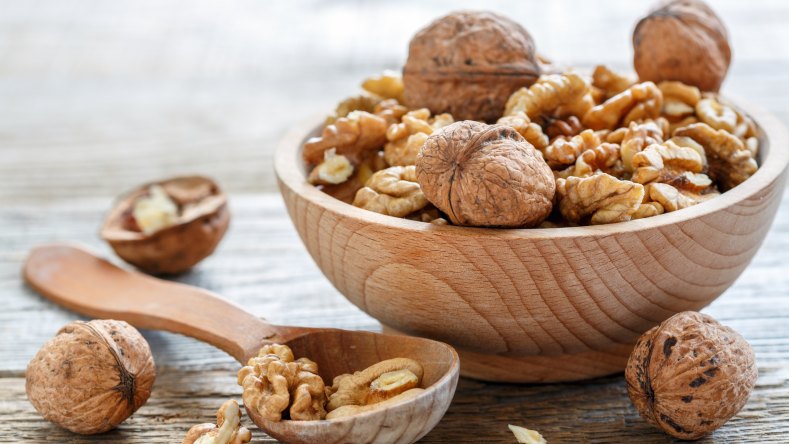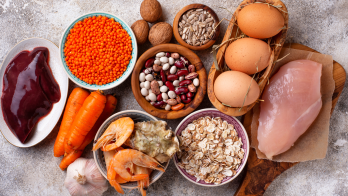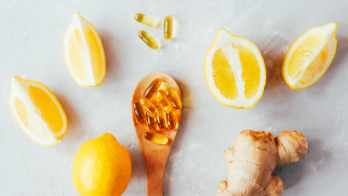6 unique, science-backed ways to enhance your immunity
Your immune system is essential for good health, as it protects you from harmful bacteria, viruses, and other pathogens. However, certain factors like stress, alcohol, and even being overweight, can weaken your immune system and leave your body vulnerable to infection. From probiotics to omega-3 fatty acids, here are some lesser-known ways you can enhance your immunity, according to science.

Your immune system is always working to keep you healthy by fighting off infectious organisms and protecting itself against harmful pathogens. However, a lack of sleep, stress, alcohol and even obesity can weaken the immune system, leaving your body wide open to infection. By now we all know the best ways to avoid sharing germs, such as hand-washing and mask-wearing, but are there things we can also do to give our immune systems a boost?
Science says yes. Let’s first start with a quick overview of how the immune system works and then dive into some lesser-known ways you can enhance your immunity and stay healthier this cold season.
How does the immune system work?
The immune system is made up of various cells, tissues, organs, and proteins to fight off pathogens, like bacteria and viruses, to keep you healthy [ 2 1 3
Causes for a weak immune system
If you have a weak immune system, you’re more prone to infection from harmful bacteria and viruses, and it becomes increasingly difficult for your body to fight them off. External factors like stress and lack of sleep can significantly reduce the body’s ability to fight infection. Additionally, medical conditions like obesity, pneumonia, bronchitis, certain cancers, and HIV also contribute to a weakened immune system [ 12 13
6 unique ways to enhance immunity
If you want to stay healthier, try some of these science-backed immunity boosters.

Eat more healthy fats.
A diet rich in plants and plant foods helps support a healthy immune system by decreasing inflammation and improving your body’s response to pathogens. While fruits and vegetables have immune-boosting antioxidants like vitamin C, E, and A, research has found that omega-3 fatty acids have anti-inflammatory properties that can help your body fight off disease-causing bacteria and viruses [ 5
Avoid alcohol and cigarettes.
Toxins (like alcohol and tobacco) can weaken your immune system. Research shows chronic alcohol consumption (> 4 drinks/day for men or > 3 drinks/day for women) lowers B and T cell levels in your body, which weakens your ability to fight infection [ 6 7
Boost gut health.
If you’re looking to boost immunity, go no further than your gut. This may sound surprising, but gut health and immune function are strongly connected. Research shows that healthy gut bacteria help your immune cells recognize any harmful organisms [ 8

Limit your sugar intake.
Studies show high sugar intakes suppress the immune system. Sugary foods like candy, baked goods, soda, and energy drinks, spike blood glucose levels and increase the production of certain inflammatory proteins that can negatively affect immune function [ 9 14
Manage chronic conditions.
If not managed correctly, chronic conditions (such as asthma, diabetes, and heart disease) can impact the immune system and increase the risk of infection [ 10

Stay current with vaccines.
Diet and lifestyle changes go a long way when it comes to improving your immunity, but it doesn’t hurt to give your body a little extra boost by way of vaccines. These prime your immune system to fight off infections before they enter your body, which bolsters your body’s natural defenses and lowers the rate of sickness (and even death) when compared to those who are not vaccinated [ 11
Summary
Your immune system plays an important role when it comes to overall health, as it fights off bacteria, viruses, and other harmful pathogens. However, if you have weakened immunity, it increases the chance of contracting an illness and makes it more challenging for your body to fight it off. Factors such as stress, poor sleep, obesity, and alcohol can negatively impact your immune system, so if you make some positive lifestyle changes, you can keep illness at bay. To boost immunity, eat more omega-3s, boost your gut health with probiotics and fermented foods, manage chronic diseases, limit alcohol, smoking, and sugary beverages, and stay up-to-date on vaccines.
Disclaimer: The text, images, videos, and other media on this page are provided for informational purposes only and are not intended to treat, diagnose, or replace personalized medical care.
Key Takeaways
Your immune system is important for health, as it protects against bacteria, viruses, and other harmful pathogens.
The immune system protects your body from anything that could make you ill (such as germs, bacteria, or viruses), and is made up of various cells, tissues, organs, and proteins to ward off pathogens and keep you healthy [
2
].If you have a weak immune system, you’re more prone to infection from harmful bacteria and viruses, and it becomes more difficult for your body to fight them off.
Research suggests that boosting gut health, managing chronic diseases, eating omega-3 fatty acids, and limiting sugary beverages can enhance your immune system and ward off infections.
References:
McComb, S., Thiriot, A., Akache, B., Krishnan, L., & Stark, F. (2019). Introduction to the Immune System. Methods in molecular biology (Clifton, N.J.), 2024, 1–24.
https://doi.org/10.1007/978-1-4939-9597-4_1
InformedHealth.org. (2006-). How does the immune system work?
https://www.ncbi.nlm.nih.gov/books/NBK279364/
https://aacijournal.biomedcentral.com/articles/10.1186/s13223-018-0278-1
Popkin, B. M., D'Anci, K. E., & Rosenberg, I. H. (2010). Water, hydration, and health. Nutrition reviews, 68(8), 439–458.
https://doi.org/10.1111/j.1753-4887.2010.00304.x
Gutiérrez, S., Svahn, S. L., & Johansson, M. E. (2019). Effects of Omega-3 Fatty Acids on Immune Cells. International journal of molecular sciences, 20(20), 5028.
https://doi.org/10.3390/ijms20205028
Barr, T., Helms, C., Grant, K., & Messaoudi, I. (2016). Opposing effects of alcohol on the immune system. Progress in neuro-psychopharmacology & biological psychiatry, 65, 242–251.
https://doi.org/10.1016/j.pnpbp.2015.09.001
Qiu, F., Liang, C. L., Liu, H., Zeng, Y. Q., Hou, S., Huang, S., Lai, X., & Dai, Z. (2017). Impacts of cigarette smoking on immune responsiveness: Up and down or upside down?. Oncotarget, 8(1), 268–284.
https://doi.org/10.18632/oncotarget.13613
Wu, H. J., & Wu, E. (2012). The role of gut microbiota in immune homeostasis and autoimmunity. Gut microbes, 3(1), 4–14.
https://doi.org/10.4161/gmic.19320
Phosat, C., Panprathip, P., Chumpathat, N., Prangthip, P., Chantratita, N., Soonthornworasiri, N., Puduang, S., & Kwanbunjan, K. (2017). Elevated C-reactive protein, interleukin 6, tumor necrosis factor alpha and glycemic load associated with type 2 diabetes mellitus in rural Thais: a cross-sectional study. BMC endocrine disorders, 17(1), 44.
https://doi.org/10.1186/s12902-017-0189-z
Berbudi, A., Rahmadika, N., Tjahjadi, A. I., & Ruslami, R. (2020). Type 2 Diabetes and its Impact on the Immune System. Current diabetes reviews, 16(5), 442–449.
https://doi.org/10.2174/1573399815666191024085838
Nicholson L. B. (2016). The immune system. Essays in biochemistry, 60(3), 275–301.
https://doi.org/10.1042/EBC20160017
Segerstrom, S. C., & Miller, G. E. (2004). Psychological stress and the human immune system: a meta-analytic study of 30 years of inquiry. Psychological bulletin, 130(4), 601–630.
https://doi.org/10.1037/0033-2909.130.4.601
Mizgerd J. P. (2018). Inflammation and Pneumonia: Why Are Some More Susceptible than Others?. Clinics in chest medicine, 39(4), 669–676.
https://doi.org/10.1016/j.ccm.2018.07.002
Jafar, N., Edriss, H., & Nugent, K. (2016). The Effect of Short-Term Hyperglycemia on the Innate Immune System. The American journal of the medical sciences, 351(2), 201–211.
https://doi.org/10.1016/j.amjms.2015.11.011







